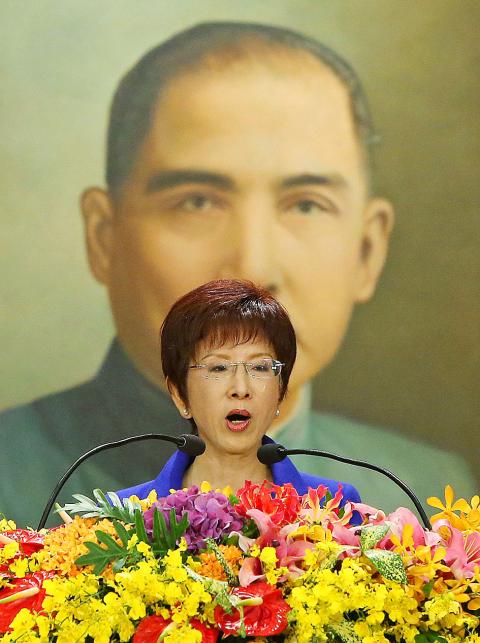The Chinese Nationalist Party (KMT) has called on members to pay “a special party fee” of NT$2,000 per person in order to “save [the party] from demise,” with KMT Chairwoman Hung Hsiu-chu (洪秀柱) said to be ready to pay her share tomorrow to set an example.
The KMT said it would launch events calling for the “special party fee” to protect its survival and a “NT$1,000 donation” drive on the eve of Retrocession Day on Tuesday “in order to defend the Republic of China’s (ROC) constitutional system of freedom, democracy and rule of law.”
Hung is to lead the party’s central leadership, city and county chapter officials and Huang Fu-hsing (黃復興) military veterans’ branch officials to pay the special party fees tomorrow while attending a “safeguard the ROC Constitution and donate NT$1,000” event that is to be held in New Taipei City tomorrow night, which is public-oriented, as opposed to the call for special party fees made to members.

PHOTO: CNA
The party said it hopes that members and the public can support the KMT to “hold out the hand of justice” and “check a Democratic Progressive Party [DPP] regime that is marching toward fascism and green terror.”
The special party fee has been set at a minimum of NT$2,000, although members can donate as much as they want, the party said.
Members who contribute during a stipulated period — from Tuesday through Dec. 25 — would receive a letter from the party chairwoman and a reprint of the certificate for the Revolutionary Party when it was founded by Sun Yat-sen (孫中山) in 1914 following the failed Second Revolution against Yuan Shikai (袁世凱) in 1913, “which is to symbolize the spirit of the [ROC’s] founding father in the Second Revolution by supporting the KMT in supervising an unjust and unconstitutional regime,” the KMT said.
Members of the public who participate in the NT$1,000 donation activity would be thanked with a reprint of the “receipt of the just pay of the Chinese Revolutionary Army” published by the Tongmenghui in 1911, a year before the founding of the ROC, which was issued so that revolutionary army soldiers could collect their pay.
It has been reported that some party workers have complained that the “special party fees” campaign calls for “reluctant donations” from party members, and have asked party headquarters to pay them their salaries before they donate.
KMT Culture and Communications Committee deputy director Hu Wen-chi (胡文琦) said that the event is simply an expression of the idea that the KMT can “save the party ourselves” and is not compulsory, adding that there would be no consequences for members who do not make contributions.
Additional Reporting by Shih Hsiao-kuang

CHANGING LANDSCAPE: Many of the part-time programs for educators were no longer needed, as many teachers obtain a graduate degree before joining the workforce, experts said Taiwanese universities this year canceled 86 programs, Ministry of Education data showed, with educators attributing the closures to the nation’s low birthrate as well as shifting trends. Fifty-three of the shuttered programs were part-time postgraduate degree programs, about 62 percent of the total, the most in the past five years, the data showed. National Taiwan Normal University (NTNU) discontinued the most part-time master’s programs, at 16: chemistry, life science, earth science, physics, fine arts, music, special education, health promotion and health education, educational psychology and counseling, education, design, Chinese as a second language, library and information sciences, mechatronics engineering, history, physical education

DEADLOCK: As the commission is unable to forum a quorum to review license renewal applications, the channel operators are not at fault and can air past their license date The National Communications Commission (NCC) yesterday said that the Public Television Service (PTS) and 36 other television and radio broadcasters could continue airing, despite the commission’s inability to meet a quorum to review their license renewal applications. The licenses of PTS and the other channels are set to expire between this month and June. The National Communications Commission Organization Act (國家通訊傳播委員會組織法) stipulates that the commission must meet the mandated quorum of four to hold a valid meeting. The seven-member commission currently has only three commissioners. “We have informed the channel operators of the progress we have made in reviewing their license renewal applications, and

The High Prosecutors’ Office yesterday withdrew an appeal against the acquittal of a former bank manager 22 years after his death, marking Taiwan’s first instance of prosecutors rendering posthumous justice to a wrongfully convicted defendant. Chu Ching-en (諸慶恩) — formerly a manager at the Taipei branch of BNP Paribas — was in 1999 accused by Weng Mao-chung (翁茂鍾), then-president of Chia Her Industrial Co, of forging a request for a fixed deposit of US$10 million by I-Hwa Industrial Co, a subsidiary of Chia Her, which was used as collateral. Chu was ruled not guilty in the first trial, but was found guilty

Taiwan People’s Party (TPP) Chairman Huang Kuo-chang (黃國昌) yesterday appealed to the authorities to release former Taipei mayor Ko Wen-je (柯文哲) from pretrial detention amid conflicting reports about his health. The TPP at a news conference on Thursday said that Ko should be released to a hospital for treatment, adding that he has blood in his urine and had spells of pain and nausea followed by vomiting over the past three months. Hsieh Yen-yau (謝炎堯), a retired professor of internal medicine and Ko’s former teacher, said that Ko’s symptoms aligned with gallstones, kidney inflammation and potentially dangerous heart conditions. Ko, charged with